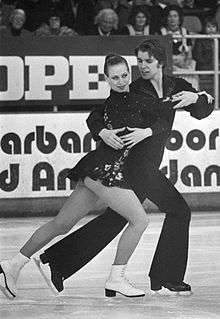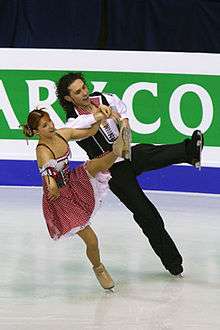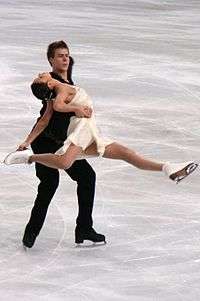Ice dancing
 | |
| Highest governing body | International Skating Union |
|---|---|
| Characteristics | |
| Team members | Duos |
| Mixed gender | Yes |
| Equipment | Figure skates |
| Presence | |
| Olympic |
Part of the Winter Olympics from 1976 (demonstration event in 1968) |
Ice dancing is a discipline of figure skating that draws from ballroom dancing. It joined the World Figure Skating Championships in 1952, and became a Winter Olympic Games medal sport in 1976.
As in pair skating, dancers compete as a couple consisting of a man and a woman. Ice dance differs from pair skating by having different requirements for lifts. Couples must perform spins as a team in a dance hold, and throws and jumps are disallowed. Typically, partners are not supposed to separate by more than two arm lengths. Originally, partners were supposed to be in a dance hold the entire program, though modern ice dancing has lifted this restriction somewhat.
Another distinction between ice dance and other skating disciplines is the use of music in the performances. In ice dancing, dancers must always skate to music with a definite beat or rhythm. Singles and pair skaters more often skate to the melody and phrasing of their music, rather than its beat. This is severely penalized in ice dance.
In some non-ISU competitions, solo dancers may also compete.
Competition segments
There are two segments in ice dance competitions: the short dance (SD), and the free dance (FD). The free dance is the most heavily weighted in the scoring and is used as a tiebreaker. Until the end of the 2009–10 season, competitions included one or more compulsory dances (CD), an original dance (OD), and the free dance.
Compulsory dances

In compulsory dances, all dance teams in a competition perform the same standard steps and holds to music of a specified tempo. One or more compulsory dances were skated as the first phase of competitions in ice dancing, but they are also popular as a form of recreational or social dance among skaters. The patterns for most dances either cover one-half or one full circuit of the rink. The International Skating Union (ISU) would publish the compulsory dances that would be performed prior to each season, and CDs were later drawn for specific events.
The compulsory dance was discontinued in all ISU competitions after the 2009–2010 season. The 2010 World Championships were the last event to include a CD (the Golden Waltz), and Italians Federica Faiella / Massimo Scali were the last dance team to perform one in competition.[1]
Original dance
.jpg)
The original dance was the second of three parts in ice dancing competitions. For the original dance, the ISU would designate a rhythm or set of rhythms each year that all dancers must perform to, or a specific theme, such as folk dance. The competitors were allowed to choose their own music and choreography. The length of the program was shorter than the free dance, and the skaters had to adhere to more rules. The dance was to be choreographed so that the steps did not cross the midline of the rink, with certain exceptions for this rule that took into account required step sequences such as the diagonal footwork sequence. Closed partnering positions and close skating were also important for the original dance.
The OD and CD were last performed in the 2009–10 season and were replaced by the short dance in the 2010–11 season.
Short dance
Following the 2009-10 season, the ISU congress voted to change the format of ice dance events and make them more similar to pairs and singles skating. Thus, the new short dance was introduced at the start of the 2010-11 season. This segment of the competition combines features of the discontinued CDs and ODs; each team performs a required pattern from one of the compulsory dances for about one half of the dance, then performs its own choreography, with some required elements, to a theme or rhythm specified by the ISU. Skaters are free to choose their own music, so long as the tempo is appropriate.
Free dance
The free dance is a part of an ice dancing competition. It is usually the second and final part of the competition to be contested, after the short dance.
In the free dance, teams are free to choose their own rhythms, program themes, and therefore music. Creativity is also strongly encouraged. Since 1998, dancers have been required to include certain elements in their free dances, including step sequences, lifts, dance spins, and multi-rotation turns called twizzles. Senior-level free dances are four minutes long (plus or minus 10 seconds) and usually include multiple music cuts and tempos that help bring variety to the routine. The hand holds and positions are much more open and free than in the compulsory and in the original dance.
Competition elements

Lifts in ice dancing differ from those in pair skating in prohibiting the man from extending his hands above his head, but allowing a wider variety of holds. The more change of direction, flexibility, and height in the lift, the greater number of points a team can earn from the judges under the Code of Points scale. Dance lifts have progressively become more athletic and risky.[2][3]
Multi-revolution jumps are not permitted but "half" jumps are now allowed. Spins must be performed by both skaters revolving around the same axis, the same as in pair spins.
History
Many of the compulsory dances were developed by dancers from Great Britain in the 1930s.[4] Ice dancing joined the World Championships in 1952. 12 of the first 16 World Championships in ice dance were won by British teams. The British style of ice dance originally emphasized upright carriage and strong edges achieved by deep knee bend. Beginning in the 1960s, Eastern European skaters started a trend to dance in more open positions, which allowed for greater speed over the ice, more upper-body involvement, and greater projection towards the audience.[5]
Ice dancing, then known as "rhythmic skating," was a demonstration event at the 1968 Winter Olympics at Grenoble, won by the team of Diane Towler and Bernard Ford of Great Britain.[6] It became an official medal event eight years later in 1976 at Innsbruck, with the first title won by Lyudmila Pakhomova / Aleksandr Gorshkov.[7]
In the 1970s, top Soviet dancers began to develop a more theatrical style of ice dancing incorporating elements of ballet and often based on narrative program themes.[8] The Russian style of dance emphasized extended line and speed, rather than difficult rhythmic footwork.[9] In some cases, elaborate choreography for the upper body was used to camouflage fundamental deficiencies of skating technique.[10]
Great Britain's Jayne Torvill / Christopher Dean won the 1984 Olympic gold medal in Sarajevo with a free dance to Ravel's Bolero that earned unanimous 6.0s for presentation.
By the early 1990s, all the top dance teams were performing dances in the theatrical, rather than ballroom, style.[11][12] Deciding to attempt to restrain theatricality, the International Skating Union pushed ice dancing to return to its ballroom roots by adding more restrictions on music and dance holds. In June 1993, the ISU decreed that free dance music must have a rhythmic beat and a melody and be arranged and orchestrated for use on the dance floor.[13] Amid complaints that ice dance had become too boring, these restrictions were removed and replaced with requirements that dancers include specified technical elements in the original dance and free dance. Step sequences in face-to-face holds, no-touching step sequences, dance lifts, dance spins, and twizzles became required elements.[14]
In 1990, the original set pattern (OSP) was replaced by the original dance (OD). For many years, competitions included two compulsory dances (CD) but this was reduced to one by 2003.
Skaters from the Four Continents have become more competitive since the 2000s. Tanith Belbin / Ben Agosto took silver in the 2006 Winter Olympics.[15] At the 2010 Winter Olympics, Tessa Virtue / Scott Moir of Canada took gold, ending Europe's 34 year streak.[16] They were the youngest skaters (aged 20 and 22 years of age, respectively) to win the Olympic ice dancing title and the first former World Junior champions to do so.
After the 2009–10 season, the ISU reduced the number of competition segments from three to two by merging the compulsory and original dances into the short dance (SD). Compulsory dances were renamed pattern dances.
Recreational Ice Dance
The majority of skaters who enjoy Ice Dance are, of course, not competing at national or international level or creating their own dance routines as described above. For everyone else the pattern dances (or set pattern dances) are the ones they will do. As the name suggests, the pattern, steps, tempo, and hold are defined, and the style described. The dances are graded in order of difficulty, and a skater of modest ability can start with the easiest (the Preliminary Foxtrot) and work their way up the scale. In the 1970's there were only two 'introductory' dances, know then as the 'Foxtrot Movement' (now the Preliminary Foxtrot), and the 'Preliminary Waltz' (now known as the British Waltz). Since then about ten new dances have been introduced, most drawing on the steps of the established dances, and these provide a graduated progression towards the established dances.[17]
The particular advantages of the pattern dances are twofold.
1) If a man and a woman each know their respective steps for any dance they can skate it together, even if they have not previously met or even speak the same language.
2) Unlike competition, where a single couple have the whole ice pad to themselves, recreational ice dancers like to have up to a dozen couples on the ice at the same time. This would be impossible if they were following different steps or different patterns, but since the pattern starts in the same place for all couples they can start the dance two bars of music apart, and provided every couple is roughly on the correct pattern nobody should be in anyone else's way.
It is outside the scope of this brief introduction to list the dances, but among the established dances, which were invented mainly around the 1930's are the Blues, Tango, Paso Doble etc. which are danced by the more proficient recreational ice dancers, and were also among those which were skated as 'Compulsory Dances' in international competition until 2010.
The patterns of all these dances are readily found on the internet under 'Ice Dance Patterns' and the various National Ice Skating Associations of each country (NISA in the UK for example) publish them and have accredited test systems for those who wish to have formal recognition of their progress. For these and also any other skaters there are various recreational dance opportunities, some of which are as follows; 1) Most rinks will have dance intervals in particular sessions, though it may only be once or twice a week. 2) Most rinks have a dance or figure and dance club with a special club ice time. 3)Many rinks participate in organised dance activities (such as the Recreatinal Ice Dance League, or RIDL, in the UK) 4) Ice dance course weeks are held in various locations around the world, some concentrating on particular dances or standards, and others open to all with different groups for the different standards.
Equipment
Ice dancers' blades are about an inch shorter in the rear than those used by skaters in other disciplines, to accommodate the intricate footwork and close partnering in dance. However, this is not always the case. They also possess a smaller pick to allow for better edge-work. The most common colors for boots are black for men and white for women. When learning the basics you must have your own boots so that you can skate on 'patch' ice, which is ice time provided for training. Skaters must have their own equipment and be of a minimum standard for these. Although not usually worn for performing dances, gloves and protective headbands may be desirable while learning. Special skating trousers and other garments are available which have more stretch than everyday ones, but at recreational level these are not essential.
Competition Rules and regulations
Partnerships composed of skaters of different nationalities are not allowed to compete under two flags; they are required to choose one country and obtain the other country's permission.
Ice dancers are required to skate to music with a definite beat. Prior to the 2014–15 season, ice dancing was the only figure skating discipline that allowed music with words in competition.
Skaters are generally free to select their own attire, with a few restrictions. Partners are not required to have matching costumes.[18] In competition, females may wear a dress, typically with matching attached briefs, and since 2004, they may also choose trousers. They may wear opaque flesh-colored leggings or tights under dresses and skirts, which may extend to cover their skates. Men must wear trousers – they are not allowed to wear tights. Skaters and family members may design their own costumes or turn to professional designers.[18][19] According to current ISU regulations, costumes in competition "must be modest, dignified and appropriate for athletic competition – not garish or theatrical in design. Clothing may, however, reflect the character of the music chosen."[20] Although the use of flesh-colored fabric means the costumes are often less revealing than they may appear, there have been repeated attempts to ban clothing that gives the impression of "excessive nudity" or that is otherwise inappropriate for athletic competition.[21] In general, accessories or props are not permitted in competition.[20] The ISU allowed an exception for the original dance in the 2007–08 season but never since.
Historical results
See:
References
- ISU Judging System at the International Skating Union at the Wayback Machine (archived 2006-06-25)
- ISU Judging System: Ice Dance at the International Skating Union at the Wayback Machine (archived 2008-11-13)
- ↑ ISU Congress News Archived March 20, 2012, at the Wayback Machine.
- ↑ Brannen, Sarah S. (2012-07-13). "Dangerous drama: Dance lifts becoming 'scary'". Icenetwork.
- ↑ Bőd, Titanilla (2012-11-21). "Zsuzsanna Nagy and Máté Fejes Love Dancing Together". Absolute Skating.
- ↑ James R. Hines (2011). Historical Dictionary of Figure Skating". p. 102. Scarecrow Press
- ↑ Smith, Beverley. Figure Skating: A Celebration. pp. 185–186.
- ↑ "Rapport Officiel Xes Jeux Olympiques D'Hiver 1968 Grenoble" (PDF). Comité d'organisation des Xemes jeux olympiques d'hiver. LA84 Foundation. 1968. Retrieved January 28, 2014.
- ↑ Russell, Susan D. (January 5, 2013). "Lyudmila Pakhomova and Aleksandr Gorshkov". IFS Magazine.
- ↑ Kestnbaum, Ellyn. Culture On Ice. p. 228.
- ↑ Kestnbaum, Ellyn. Culture On Ice. p. 246.
- ↑ Smith, Beverley. Figure Skating: A Celebration. pp. 192–196.
- ↑ Kestnbaum, Ellyn. Culture On Ice, Chapter 11.
- ↑ Smith, Beverley. Figure Skating: A Celebration. p. 197.
- ↑ Reiter, Susan (1995-03-01). "Ice dancing: a dance form frozen in place by hostile rules". Dance Magazine. The Free Library. (FindArticles)
- ↑ Loosemore, Sandra (1999-12-01). "Technique, not judges, keeping Canadian tandem from top". CBS Sportsline. Archived from the original on 2000-10-06.
- ↑ "Canada, U.S. make N. America 1-2". ESPN. 2010-02-23.
- ↑ "Canada's Virtue-Moir Win Ice Dance Gold". New York Times. Associated Press. February 23, 2010.
- ↑ NISA Ice dance manual
- 1 2 Golinsky, Reut (2012-08-18). "Costumes on Ice, Part I: Ice dance". Absolute Skating.
- ↑ Brannen, Sarah S. (2012-08-20). "Fashion forward: Designers, skaters on costumes". Icenetwork.
- 1 2 "Special Regulations & Technical Rules: Single & Pair Skating and Ice Dance 2012" (PDF). International Skating Union. June 2012. Archived from the original (PDF) on 29 October 2013.
- ↑ The 1999 Official USFSA Rulebook. SSR 19.00, U.S. Figure Skating, 1998
External links
| Wikimedia Commons has media related to Ice dancing. |